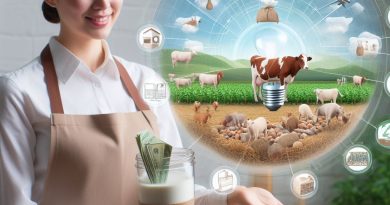Eco-Friendly Livestock Farming Techniques
Last Updated on November 20, 2023
Introduction
Eco-friendly livestock farming techniques play a crucial role in addressing environmental concerns and ensuring sustainable food production.
Traditional livestock farming practices often contribute to deforestation, water pollution, and greenhouse gas emissions.
In contrast, eco-friendly techniques prioritize the well-being of animals and minimize negative impacts on the environment.
By adopting eco-friendly livestock farming techniques, farmers can reduce their reliance on synthetic fertilizers, pesticides, and antibiotics.
These methods promote natural and organic farming practices, conserving soil fertility and biodiversity.
Proper waste management and utilization also help minimize pollution and facilitate nutrient recycling.
Moreover, eco-friendly livestock farming techniques prioritize animal welfare, providing them with a more natural and stress-free environment.
This approach includes designing healthier and more spacious housing, ensuring access to clean water and a balanced diet, and adopting preventive healthcare measures.
In this blog post, we will delve into various eco-friendly livestock farming techniques such as rotational grazing, agroforestry, and organic feed production.
We will explore how these methods can improve soil health, reduce greenhouse gas emissions, and promote sustainable land use.
By adopting eco-friendly livestock farming techniques, farmers can contribute to mitigating climate change, conserving natural resources, and producing healthier and more sustainable food.
This blog post aims to inspire and guide readers in implementing eco-friendly practices on their farms for a brighter and greener future.
Benefits of Eco-Friendly Livestock Farming Techniques
In recent years, the importance of eco-friendly livestock farming techniques has gained significant attention.
These techniques not only prioritize the welfare of the animals but also aim to minimize the negative impact of livestock farming on the environment.
By implementing such practices, there are several benefits that can be achieved.
Reducing carbon footprint
One of the key benefits of adopting eco-friendly livestock farming techniques is the significant reduction in carbon footprint.
This can be achieved by utilizing renewable energy sources such as solar or wind power to meet the energy requirements of the farm.
By relying on renewable energy, the greenhouse gas emissions associated with conventional energy sources can be significantly reduced.
Additionally, implementing energy-efficient systems for lighting, ventilation, and machinery further reduces energy consumption and the overall carbon footprint.
Minimizing water usage and pollution
Another significant advantage of eco-friendly livestock farming techniques is the minimization of water usage and pollution.
Livestock farming requires a significant amount of water for various purposes, including animal drinking, sanitation, and irrigation.
By implementing water-saving technologies such as drip irrigation and efficient watering systems, the amount of water required for farming can be reduced.
Proper waste management practices, including the appropriate disposal and treatment of animal waste, prevent water pollution and contamination, ensuring the health and safety of water sources.
Preserving biodiversity
Furthermore, eco-friendly livestock farming techniques play a crucial role in preserving biodiversity.
Livestock farming often leads to the destruction of natural habitats, threatening the survival of numerous plant and animal species.
By protecting and conserving natural habitats, such as forests or wetlands, the biodiversity of the region can be safeguarded.
Additionally, promoting sustainable grazing practices, such as rotational grazing, allows for the maintenance of diverse ecosystems, ensuring that the land can support a variety of plant and animal life.
In essence, eco-friendly livestock farming techniques offer numerous benefits for both the environment and the farming industry.
By reducing the carbon footprint through the use of renewable energy and energy-efficient systems, the negative impact of livestock farming on climate change can be mitigated.
Minimizing water usage and pollution through water-saving technologies and proper waste management helps preserve water resources and protect ecosystems.
Moreover, by preserving biodiversity and promoting sustainable grazing practices, the natural habitats can be protected, ensuring the long-term sustainability of the livestock farming industry and the surrounding ecosystems.
Implementing these techniques is not only environmentally responsible but also economically beneficial in the long run.
Eco-Friendly Feed Production
Utilizing organic and locally sourced feed
Livestock farming plays a crucial role in the global food industry, but traditional methods have led to environmental degradation.
However, by adopting eco-friendly techniques, such as using organic and locally sourced feed, farmers can reduce their carbon footprint and promote sustainable farming practices.
Organic feed is produced without the use of synthetic fertilizers, pesticides, or genetically modified organisms.
This not only ensures the welfare of the animals but also minimizes the harmful effects on the environment.
By supporting organic feed production, farmers contribute to preserving biodiversity and reducing chemical pollution.
Locally sourced feed reduces the carbon emissions associated with transportation.
By sourcing feed from nearby farms, farmers can minimize the distance traveled by the feed, resulting in lower fuel consumption and reduced greenhouse gas emissions.
This not only benefits the environment but also supports the local economy.
Promoting regenerative agriculture practices
Regenerative agriculture is a holistic approach to farming that aims to restore and revive the health of the soil.
By implementing regenerative practices in feed production, farmers can enhance soil fertility, conserve water, and mitigate the effects of climate change.
Cover cropping involves planting crops, such as legumes or grasses, between growing seasons to prevent soil erosion, improve soil structure, and increase organic matter content.
These cover crops can also serve as animal feed, reducing the need for external sources.
Crop rotation allows for the diversification of crops grown and helps break pest cycles, leading to reduced reliance on chemical pesticides.
By rotating feed crops, farmers can maintain healthy soil, reduce pests, and ensure a more sustainable agricultural system.
Reducing food waste through efficient feed conversion ratios
Efficient feed conversion ratios (FCR) are essential for maximizing the use of feed resources and minimizing food waste.
By optimizing FCR, farmers can reduce the environmental impact of livestock farming and enhance overall efficiency.
FCR represents the amount of feed required to produce a unit of animal product, such as meat or milk.
By selecting animals with better feed conversion abilities and using high-quality feed, farmers can reduce waste and improve resource utilization.
Implementing precision feeding techniques can further enhance FCR.
By providing animals with precisely measured feed rations based on their nutritional requirements, farmers can minimize overfeeding, reduce waste, and maintain optimal animal health.
In brief, eco-friendly feed production techniques are vital for sustainable livestock farming practices.
By utilizing organic and locally sourced feed, promoting regenerative agriculture practices, and reducing food waste through efficient FCR, farmers can contribute to a greener and more sustainable future.
Adopting these techniques not only benefits the environment but also ensures the production of high-quality and ethically sourced animal products.
Let us strive towards a more eco-friendly livestock farming industry for a healthier planet.
Read: Sustainable Tech in Agriculture: A New Era
Sustainable Water Management
Collecting and reusing rainwater
One effective way of practicing eco-friendly livestock farming is by collecting and reusing rainwater.
Rainwater harvesting systems can be installed to capture rainwater from roofs and store it in tanks or reservoirs.
This collected rainwater can then be used for various farming activities, including watering crops and providing drinking water for livestock.
By relying on rainwater, farmers can reduce their dependency on groundwater and surface water sources.
Implementing efficient irrigation systems
Another crucial aspect of sustainable water management in livestock farming is implementing efficient irrigation systems.
Traditional irrigation methods, such as flood irrigation, can lead to significant water wastage.
Instead, farmers can opt for techniques like drip irrigation or precision sprinklers that deliver water directly to plant roots.
These systems ensure that water is used more efficiently, targeting specific areas that need irrigation and reducing runoff.
Efficient irrigation can result in significant water savings and improved crop growth.
Natural water filtration methods
To further promote eco-friendly practices in livestock farming, natural water filtration methods can be employed.
Constructed wetlands are one such method that utilizes plants and microorganisms to filter and treat wastewater.
These wetlands mimic natural ecosystems, providing a sustainable and cost-effective way to treat agricultural wastewater.
By implementing natural water filtration methods, pollutants can be removed from the water before being discharged.
This not only helps protect the environment but also ensures that freshwater resources are preserved and conserved.
In general, sustainable water management practices play a vital role in eco-friendly livestock farming.
Collecting and reusing rainwater, implementing efficient irrigation systems, and employing natural water filtration methods are all key strategies.
By adopting these practices, farmers can reduce their environmental impact, conserve water resources, and promote sustainable agricultural practices.
Read: Agri-Drones: Changing the Face of Farming

Waste Management and Composting Techniques
Waste management plays a crucial role in ensuring sustainable and eco-friendly livestock farming practices.
Proper disposal and utilization of waste materials are essential for maintaining a healthy environment and maximizing the benefits derived from livestock farming.
In this section, we will explore various waste management and composting techniques that contribute to eco-friendly livestock farming.
Proper manure management
The effective management of livestock manure is vital for reducing the environmental impact of farming operations.
Livestock manure contains valuable nutrients that can be utilized as a natural fertilizer; however, improper handling can lead to pollution of water bodies and emission of greenhouse gases.
Here are some key practices for proper manure management:
- Regular removal of manure from livestock facilities to prevent accumulation and odour issues.
- Use of manure storage systems such as anaerobic digesters or covered lagoons to prevent nutrient runoff and greenhouse gas emissions.
- Applying manure to cropland at appropriate rates and times to optimize nutrient utilization and reduce the risk of nutrient runoff.
- Incorporating manure into the soil instead of surface application to minimize nitrogen volatilization and promote nutrient absorption by plants.
Composting for nutrient-rich soil
Composting is a natural process that helps convert organic waste, including livestock manure and bedding materials, into nutrient-rich soil amendments.
It offers several benefits for eco-friendly livestock farming:
- Composting kills pathogens and weed seeds present in organic waste, reducing the risk of disease transmission and weed infestation.
- The resulting compost improves soil structure, water-holding capacity, and nutrient availability, enhancing crop growth and reducing the need for chemical fertilizers.
- Composting reduces odor issues associated with raw manure, making it more pleasant to handle and decreasing potential complaints from neighboring communities.
- Using compost can also contribute to carbon sequestration, mitigating climate change by storing carbon in the soil.
Biogas production from organic waste
Biogas production from organic waste offers a sustainable solution for both waste management and renewable energy generation.
Organic waste, including livestock manure, can be processed through anaerobic digesters to produce biogas, a mixture of methane and carbon dioxide.
Here are the benefits of biogas production from organic waste:
- Biogas can be used as a renewable energy source to generate heat and electricity, reducing reliance on fossil fuels and lowering greenhouse gas emissions.
- The anaerobic digestion process significantly reduces the odor and pathogens present in livestock waste, improving environmental and public health.
- The by-product of biogas production, called digestate, is a nutrient-rich fertilizer that can be safely applied to land, completing the nutrient cycle.
- Biogas production helps to mitigate climate change by capturing methane, a potent greenhouse gas, and utilizing it as a source of energy instead.
Overall, effective waste management and composting techniques are essential for eco-friendly livestock farming.
By implementing proper manure management, utilizing composting for nutrient-rich soil, and harnessing biogas production from organic waste, farmers can enhance sustainability, reduce environmental impact, and promote the circular economy in livestock farming.
Read: Vertical Farming: The Rise of Urban Agriculture
Encouraging Biodiversity on Livestock Farms
Protecting and restoring native vegetation
- Implementing measures to protect and conserve existing native vegetation on livestock farms.
- Restoring degraded areas by replanting native species that provide habitat and food for wildlife.
- Establishing buffer zones around water bodies to prevent soil erosion and protect aquatic ecosystems.
- Promoting the use of native pasture grasses that are well adapted to the local climate and require less water and fertilizer.
Creating wildlife-friendly habitats
- Providing suitable nesting sites, such as bird boxes and bat roosts, to encourage the presence of beneficial species.
- Cultivating flowering plants that attract pollinators like bees and butterflies, enhancing biodiversity and supporting crop production.
- Preserving natural features like wetlands and ponds that serve as breeding grounds for amphibians and other aquatic organisms.
- Designing specific areas on the farm to cater to the needs of beneficial insects, such as ladybugs and lacewings, which control pests naturally.
Integrating agroforestry practices
- Planting trees and shrubs within livestock farms to provide shade, windbreaks, and food sources for both wildlife and the animals.
- Establishing mixed-species hedgerows that act as corridors for wildlife movement and contribute to erosion control.
- Implementing alley cropping systems, where crops are interplanted with rows of trees, improving soil fertility and providing diverse habitats.
- Using agroforestry to reduce the reliance on synthetic fertilizers by fixing nitrogen and increasing nutrient cycling within the farm ecosystem.
By adopting these eco-friendly livestock farming techniques, it is possible to promote biodiversity on farms while maintaining sustainable production.
Protecting and restoring native vegetation not only enhances wildlife habitats but also contributes to carbon sequestration and climate change mitigation.
Creating wildlife-friendly habitats not only supports beneficial species but also helps with natural pest control and pollination, benefiting agricultural operations.
Integrating agroforestry practices not only improves soil health and fertility but also reduces soil erosion and enhances water conservation on farms.
Furthermore, these techniques promote a more resilient farm ecosystem, better equipped to withstand environmental challenges and adapt to changing conditions.
Therefore, it is crucial for livestock farmers to prioritize biodiversity conservation and actively implement these practices on their farms.
By working towards a harmonious coexistence with nature, eco-friendly livestock farming can contribute to a healthier planet for current and future generations.
Read: Managing Livestock Stress: Strategies & Tips
Renewable Energy Sources for Livestock Farms
In order to promote eco-friendly practices in livestock farming, it is crucial to explore renewable energy sources that can reduce the reliance on traditional fossil fuels.
By implementing sustainable energy solutions, farmers can lower their carbon footprint and contribute to a more sustainable and environmentally friendly livestock industry.
Solar energy for electricity needs
Solar energy has gained significant popularity as a renewable energy source for livestock farms.
Installing solar panels on farm buildings can generate electricity to power various operations, including lighting, ventilation, and water pumping.
These solar systems can harness the abundant energy from the sun and convert it into usable electricity, reducing the dependence on non-renewable sources.
Additionally, solar energy systems have become more affordable and efficient over the years, making it a viable option for many farmers.
By utilizing solar power, livestock farms can reduce their electricity bills while also reducing greenhouse gas emissions.
Wind energy for powering farm operations
Another renewable energy source that livestock farms can tap into is wind energy.
Wind turbines can be installed on farm land to generate electricity.
These turbines capture the power of the wind and convert it into clean, renewable energy that can be used to power a variety of farm operations, such as machinery, ventilation systems, and water pumps.
Wind energy is especially suitable for farms located in areas with consistent wind patterns.
By harnessing the power of the wind, farms can significantly reduce their reliance on conventional energy sources and decrease their carbon emissions.
Biogas as a substitute for fossil fuels
Biogas, produced from organic waste materials, presents an excellent alternative to fossil fuels in the livestock farming industry.
Livestock farms produce a significant amount of organic waste, such as manure and agricultural residues.
Instead of letting this waste release harmful greenhouse gases, it can be collected and used to generate biogas.
Biogas production involves anaerobic digestion, a natural process where microorganisms break down organic matter in the absence of oxygen.
The biogas produced can be used as a source of energy for heating, electricity generation, or fueling farm vehicles.
This not only reduces the farm’s carbon emissions but also helps manage waste effectively.
Furthermore, the by-product of anaerobic digestion, called digestate, is a nutrient-rich fertilizer that can be used to enhance soil health and crop productivity.
Utilizing biogas as an energy source creates a closed-loop system where waste is transformed into valuable resources.
Embracing renewable energy sources in livestock farming is a crucial step towards a more sustainable and eco-friendly industry.
Through the utilization of solar energy, wind energy, and biogas, farmers can significantly reduce their dependence on fossil fuels while also minimizing their environmental impact.
Investing in renewable energy not only benefits the environment but also provides long-term cost savings for livestock farms.
As technology continues to advance, these sustainable energy solutions are becoming more accessible and affordable for farmers worldwide.
By incorporating renewable energy sources into livestock farming practices, we can work towards a greener future where the agricultural industry plays a key role in mitigating climate change and preserving the planet for future generations.
Conclusion
Eco-friendly livestock farming is pivotal. It fosters sustainability, animal well-being, and resource conservation. These techniques harmonize with nature.
It is crucial for farmers to understand the significance of implementing sustainable practices.
Farmers, embrace sustainable practices. They optimize productivity while safeguarding the environment.
Your role is crucial; make a difference.
Adopting eco-friendly techniques ensures a lasting positive impact.
The environment benefits, and long-term sustainability becomes achievable. Together, let’s cultivate a greener, healthier future.
Moreover, by adopting eco-friendly techniques, farmers can have a positive impact on the environment and ensure long-term sustainability.


